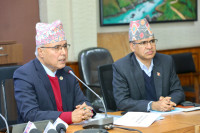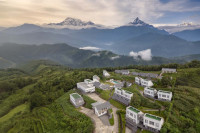Money
Auto dealers see rough road ahead despite end of curbs
The central bank has removed the provision requiring car importers to keep 100 percent margin amount to open a letter of credit.
Krishana Prasain
Car dealers see a rough road ahead even though the central bank has made life easier by cancelling the margin amount provision.
This provision requires importers to keep 100 percent margin amount to open a letter of credit (LC), and is widely disliked by the automobile sector which blames it for wrecking their business.
Nepal Rastra Bank lifted the margin requirement, which has been around for 14 months, on January 19 while a seven-month-long import ban on several items ended two months ago.
Dhruba Thapa, president of the Nepal Automobile Dealers Association, praised the end of the margin requirement saying it was good news for the automobile sector.
"Bank interest is also falling, and this should boost market confidence," he said. "Car dealers have already started opening LCs to import automobiles, but imports have not rebounded to even 25 percent of previous levels. The market has slowed.”
The central bank issued a provision requiring car importers to keep 100 percent margin amount to open an LC on December 20, 2021. This meant importers had to deposit the full LC amount with their bank.
The move was an effort to stem imports after Nepal's foreign currency reserves started declining too fast.
On April 26, 2022, the central bank embargoed 10 types of goods described as luxury items. They included vehicles and motorcycles of over 250 cc capacity. Harsher restrictions followed, and the government even restricted motorcycles with a capacity of more than 150 cc.
On August 30, the government loosened the restrictions and permitted the import of diamonds, large television sets, toys, cards, snacks and tobacco.
But the ban on automobiles, mobile phones, liquor and heavy motorcycles was extended until December 15, 2022.
Thapa complained that banks do not finance the automobile sector because a 150 percent risk-bearing provision has been imposed on it.
"The auto loan limit of 50 percent of the value of the vehicle also needs to be increased. This will not create market demand and raise sales as banks will not provide finance easily," he said.
"A few enquiries have started to come from customers, but the market is gloomy."
According to the central bank, the foreign exchange reserves of the banking sector, computed on the basis of the imports of the first five months of the current fiscal year 2022-23, are sufficient to cover prospective merchandise imports of 10 months, and merchandise and services imports of 8.7 months.
The gross foreign exchange reserves increased 3 percent to $9.82 billion in mid-December 2022 from $9.54 billion in mid-July 2022.
According to the Department of Customs, Nepal imported vehicles worth Rs23.34 billion in the first five months of the current fiscal year ended mid-December as compared to Rs53.45 billion in the same period of the last fiscal year.
“There are very few enquiries for four-wheelers while bookings are almost zero, so we have not opened LCs to import new vehicles,” said Siraj Pant, general manager of CG Motocorp, the authorised dealer of Suzuki four-wheelers in Nepal.
"The interest rate is still very high. Banks are providing only 50 percent financing service, so customer excitement has not returned even though the margin requirement has been removed," he said.
“We still have LCs that were opened before imports were banned, and vehicle shipments have been put on hold. As soon as we get bookings, we will have the vehicles dispatched,” Pant said.
Automobile traders said that the economic slowdown might have impacted demand.
Raju Chhetri, CEO of Yamaha Nepal, says the company ordered two-wheelers a month ago, and new lots of motorbikes will be arriving within two months.
“Demand for motorbikes is not as expected. The market has slowed,” Chhetri said.
"The ban on two-wheelers which lasted for nearly seven months changed customer preference. They lost interest in what they had originally planned to buy, and this altered demand trends for certain models," Chhetri said.
Two-wheeler sales have declined by 50 percent, said automobile dealers.
"New batches of automobiles will start arriving after 15 days. Auto prices will increase by 15-25 percent compared to what they were before the import ban as manufacturers have revised their prices more than three times in the past year,” Thapa said.




 15.12°C Kathmandu
15.12°C Kathmandu















